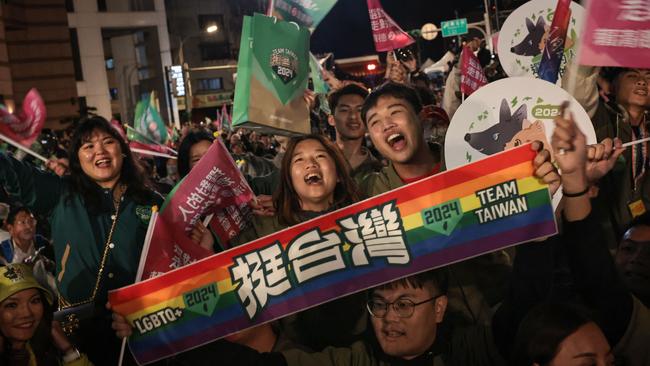
The communist party’s best efforts to keep William Lai out of Taiwan’s presidential office failed. However, the result also creates new opportunities for Xi Jinping.
As expected, the incoming President’s Democratic Progressive Party has lost control of the Legislative Yuan, Taiwan’s parliament. Passing legislation in the coming four-year term won’t be easy.
Each vote will require the DPP getting the support of either the Kuomintang or the new upstart party, Ko Wen-je’s Taiwan People’s Party, whose youthful support base made it the other big winner on Saturday.
In his victory speech, Lai said he would work to bring a new style of “communication, consultation, participation and co-operation” to Taiwan’s parliament. That would be quite a change from its famously combative politics.
Diplomats in Taipei have told The Australian they expect Beijing will do everything it can to inflame partisan differences, obstruct Lai’s agenda and try to undermine the Taiwanese people’s faith in their democratic system.
“They will try to make chaos,” one Western diplomat told me.
So far, Beijing is failing at that too. Despite all the existential rhetoric on the campaign trail, this weekend’s vote was notable for the respect for the electoral process displayed by the three main candidates and Taiwan’s proudly democratic voters.
The more immediate concern in Taipei, Washington, Canberra and other capitals, is what Beijing does in the near term.
No one credible expects Beijing will go through with its pre-election war threats, but waves of economic sanctions are expected. So are intimidating drills by China’s People’s Liberation Army in the lead up to the president-elect’s inauguration in May.
When I asked Lai at a press conference on Tuesday how he would engage with Beijing if he won, he said he was open to talk so long as there was “parity and dignity”. That’s the same formula Xi has rejected for the last eight years under the departing DPP President, Tsai Ing-wen.
Senior advisers to Lai have told me that they hope that China’s leader may reflect on the failure of his pugnacious approach.
However, they are under no illusion, aware that Xi is not known for his flexibility.
In a stunning election-eve contribution, Beijing’s top envoy in Australia made it clear just how high the stakes of Taiwan’s future are for Canberra.
Ambassador Xiao Qian warned the Albanese government of nightmarish consequences if it made any “miscalculations” in its ties with the incoming Taiwanese government.
Beijing is not acting when it says it is rattled by Lai. They have spent a year portraying him to their people and the world as a “separatist” and “troublemaker”. He is now Taiwan’s fifth democratically elected president.
Xi’s government is going to put tremendous pressure on Australia and other liberal democracies that are trying to strengthen their unofficial relations with Taiwan within their “One China” policy framework.
Taipei’s long-held goal to get a free-trade agreement with Australia looks like a non-starter with Lai in power – unless there is a dramatic change of thinking in Canberra in the coming years, or a change in government.
The stakes of supporting Taiwan’s application to join the CPTPP trade agreement have also risen.
Chinese diplomats could not be more explicit that it is the sort of thing Beijing would consider a grave “miscalculation”. No surprise then that Canberra seems to be determined to kick both Taiwan and China’s applications as far as possible into the future.




The Taiwanese presidential election is more than just a slap in the face for Beijing – although it is that too.